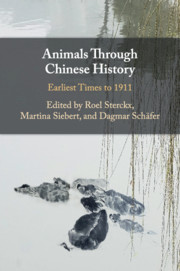Animals through Chinese History
Earliest Times to 1911
This volume opens a door into the rich history of animals in China. As environmental historians turn their attention to expanded chronologies of natural change, something new can be said about human history through animals and about the globally diverse cultural and historical dynamics that have led to perceptions of animals as wild or cultures as civilized. This innovative collection of essays spanning Chinese history reveals how relations between past and present, lived and literary reality, have been central to how information about animals and the natural world has been processed and evaluated in China. Drawing on an extensive array of primary sources, ranging from ritual texts to poetry to veterinary science, this volume explores developments in the human–animal relationship through Chinese history and the ways in which the Chinese have thought about the world with and through animals. This title is also available as Open Access on Cambridge Core at doi.org/10.1017/9781108551571.
Roel Sterckx is Joseph Needham Professor of Chinese History, Science, and Civilization at the University of Cambridge and Fellow of Clare College. He is the author of Food, Sacrifice, and Sagehood in Early China (2011) and other studies on the cultural history of pre-imperial and early imperial China.
Martina Siebert works as area specialist for China at the Staatsbibliothek zu Berlin and as an independent scholar. She has written on the role of nature studies in the Chinese world of learning, the classification of animals and the construction of technological pasts.
Dagmar Schäfer is Director of Department III, ‘Artefacts, Action and Knowledge’, of the Max Planck Institute for the History of Science in Berlin. She has published widely on materiality, the processes and structures that lead to varying knowledge systems, and the changing role of artefacts – texts, objects and spaces – in the creation, diffusion and use of scientific and technological knowledge.



